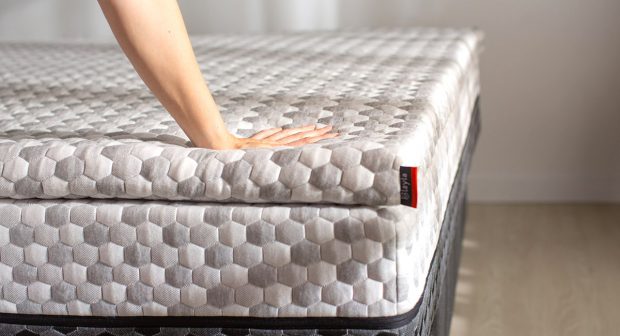You’re a grownup — so why do you need a mattress protector? Well, even if you’ve outgrown your bedwetting stage, your body still perspires, produces sebaceous oil, drools, and sheds dead skin flakes throughout the night. All of that stuff can get into your mattress, and once it’s in there, it’s in there for good.

That’s pretty gross, but it gets worse. Dust mites love to colonize mattresses and pillows, so they feast on the dead skin cells we shed while we sleep. When you sleep without a mattress protector, dead skin cells can get inside the mattress, and that will encourage more dust mites to live out their microscopic lives inside your mattress. That means your mattress will accumulate allergens, become unsanitary sooner, and begin to break down faster than it would if you simply covered it with a mattress protector.
Keep Your Mattress Clean
You change your sheets every week or two, because you want to sleep in a clean, sanitary bed. Your linens absorb a lot of sweat, saliva, and other body fluids in the course of sleep and intimate activities, and your body sheds about 15 million skin cells each night. You already know that if you don’t change your sheets, you could get acne or athlete’s foot, or even encourage the growth of deadly Staphylococcus aureus bacteria, which can cause fatal, antibiotic-resistant infections.
It’s not enough to just change your sheets every week or two, however. Moisture and dead skin cells easily fall through sheets and wind up in the mattress itself. A mattress protector keeps the inside of your mattress from becoming a dark, moist breeding ground for dust mites, bacteria, and fungus. Your mattress will stay clean and hygienic. No one will break out in pimples or contract a deadly staph infection.
Relieve Allergy and Asthma Symptoms
Mattress protectors have been shown to mitigate asthma symptoms in some children with asthma, reducing those patients’ dependence on their asthma medication. Now, that doesn’t mean you’ll be able to toss out the inhalers after you’ve covered the mattresses. But it does mean that mattress protectors can make a noticeable difference in quality of life for people with allergies and asthma, particularly those who are allergic to dust mites.
It makes sense that if dust mites are barred from getting inside the mattress, and the mattress protector is also regularly washed, you’ll have fewer dust mites in your bed and therefore fewer symptoms of sniffing, sneezing, coughing, sore throat, asthma skin rashes, or eye irritation. A mattress protector can really improve allergy and asthma symptoms in those sensitive to dust mites, and you can buy an organic mattress pad for sleepers who are sensitive to dyes, bleaches, or other chemicals.
Extend the Life of Your Mattress
Will your mattress last longer when you put a mattress protector on it? Yes, definitely!
All of the sweat and other fluids that your body secretes at night can, if allowed to soak into your mattress, break down the foam padding and other materials inside the mattress. This means your mattress will break down sooner and need to be replaced sooner if you sleep on it without a mattress protector.
That’s not the only reason sleeping without a mattress protector can be considered living dangerously. Dust mites and other debris build up inside your unprotected mattress at an alarming rate, so that it’s simply unsanitary to continue sleeping on an unprotected mattress after five or eight years. If you’ve been sleeping without mattress protectors, how many mattresses have you gone through in your life? They’re not supposed to get saggy and smelly after just a few years of use. A mattress protector can keep your mattress clean and in like-new condition, extending the life of the materials in the mattress by keeping them clean and dry night after night.
Depending on what kind of mattress you choose, a mattress protector is essential if you want to use the mattress for its full expected lifespan. For example, natural latex mattresses can retain their supportive elasticity for 20 years, but you won’t want to keep sleeping on one that long if it’s been allowed to accumulate debris and absorb moisture willy-nilly for years. With a mattress protector, though, your natural latex mattress could stay just as attractive, clean, and comfortable as it was on the day you bought it.
Mattress protectors aren’t just for little kids. Everyone needs to protect their mattresses from bodily secretions, dead skin, dust mites, fungus, and bacteria. Protect your mattress today, and start enjoying better health and better sleep right away.



